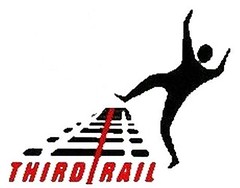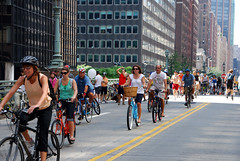The real third rail of local politics is transportation-automobility, not parking

There is the joke that Social Security and Medicare is the third rail of national politics, that proposals for change end up electrocuting those who suggested the change. Typically, we say the same about parking, at the local level, but the more I think about it, it's not so much parking as it is changing the focus away from automobile dominance that is the third rail...
DC. E.g., I was talking with a DC Councilmember a couple months ago and s/he said that s/he wouldn't be dealing with parking issues any more until after the 2010 election, that dealing with it thus far (in a variety of matters) has been very very difficult, plus s/he pointed out the problems of Mayor Daley in Chicago, in response to his parking meter sale deal and the resultant rise in prices (cites in the previous entry). While I am a hardcore type, believing that we need to do the right thing, and that "leaders lead," at the same time, I understand in this arena, the need for some judiciousness.
Seattle. Of course, Mayor Greg Nickels of Seattle just lost the primary election there (see "Mayor Nickels of Seattle Concedes Defeat in Primary" from the New York Times) and under his administration, Seattle has been doing some of the most innovative work with transportation and mobility issues at the municipal level of any government in the U.S., including New York City.
In part, he was brought down by failures to execute (they had a snow emergency which they didn't do too well at addressing), but also over the many years of proposals and counter-proposals of how to deal with the Alaskan Way Viadect, an above ground bridge/freeway that has to be addressed to reduce the likelihood of catastrophic failure in the face of possible earthquakes. He favors a tunnel. Others want an at-grade replacement. Etc.
London. I've mentioned that Ken Livingstone's loss for a third mayoral term was in large part a response to his plans to expand the congestion zone to more residential areas. (See the Bloomberg story "London Ex-Mayor Livingstone Plans 2012 Bid for Office.")
New York City. And now, we have Streetsblog reporting that two prominent candidates for Mayor have announced that they will not retain Janette Sadik-Khan, appointed by Mayor Bloomberg as Commissioner of Transportation, if they are elected. See "Thompson, Avella Pledge to Dump Sadik-Khan If Elected."

Janette Sadik-Khan bicycling during New York City's Summer Streets program, with no special entourage. Photo by Dan Malouff.
Some neighborhoods are pissed off about terrible changes to their world like adding bicycle lanes, and these candidates are showing their responsiveness to neighborhood parochialism.
Making the right choice and thinking about the future is very hard. Typically, people want to keep what they have, and they don't think too globally about making the best choices.
It happens that James Surowecki writes about this in the current issue of the New Yorker, in "Status-Quo Anxiety." While he is writing about the response to potential for changes in health insurance and health care delivery, as a result of proposals for changes initiated by President Obama and addressed by Congress, the points he makes are relevant to all issues involving substantive change. He writes:
In theory, the public overwhelmingly supports reform—earlier this year, polls showed big majorities in favor of fundamental change. But, when it comes to actually making fundamental change, people go all wobbly. Just about half of all Americans now disapprove of the way the Obama Administration is handling health care.
In part, of course, this is because of the non-stop demonization of the Obama plan. But the public’s skittishness about overhauling the system also reflects something else: the deep-seated psychological biases that make people resistant to change. Most of us, for instance, are prey to the so-called “endowment effect”: the mere fact that you own something leads you to overvalue it. ...
What this suggests about health care is that, if people have insurance, most will value it highly, no matter how flawed the current system. And, in fact, more than seventy per cent of Americans say they’re satisfied with their current coverage. More strikingly, talk of changing the system may actually accentuate the endowment effect. ...
Compounding the endowment effect is what economists dub the “status quo bias.” Myriad studies have shown that, even if you set ownership aside, most people are inclined to keep things as they are: when it comes to things like 401(k)s, for instance, people tend to adopt whatever their company’s default option is, and with things like asset allocation or insurance plans people tend to stick with whatever they start with. Just designating an option as the status quo makes people rate it more highly. Some of this may be the result of simple inertia, but our hesitancy to change is also driven by our aversion to loss. ...
Still, just because you can’t change human nature doesn’t mean you can’t change health care. The key may be to work with, rather than against, people’s desire for security. .... the endowment that insured people want to hold on to is much shakier than it appears. Changing the system so that individuals can get affordable health care, while banning bad behavior on the part of insurance companies, will actually make it more likely, not less, that people will get to preserve their current level of coverage. The message, in other words, should be: if we want to protect the status quo, we need to reform it.
-----------
Re Surowecki's conclusion: The message, in other words, should be: if we want to protect the status quo, we need to reform it.
What people aren't willing to acknowledge is that the mobility status quo needs to change too, not just because of the likelihood of reaching peak oil and diminishing supplies of gasoline, but because it's impossible and inefficient to rely on a mobility paradigm that requires automobility to move us and connect us to and from pods of otherwise disconnected activity.
For one, you can't build enough roads and parking lots and parking spaces to accommodate all the cars necessary to move people around from pod to pod.
For another, cities weren't designed to optimize movement by automobile, they were designed to optimize walking and transit (and to some extent bicycling).
For cities to work best, walking, bicycling and transit must continue to be optimized, in order to maintain center city competitive advantages around mobility, economic agglomeration, and the relative ease of connecting.
That means strengthening the ability to get around by walking and bicycling and transit, and deemphasizing the focus on and fealty to the automobile.
In the meantime, that makes the position of most of the people who are at the forefront of pushing these changes forward very tenuous. (The elected officials of Arlington County, Virginia seem to be an exception.)
Labels: change-innovation-transformation, electoral politics, electoral politics and influence, progressive urban political agenda, transportation planning



0 Comments:
Post a Comment
<< Home